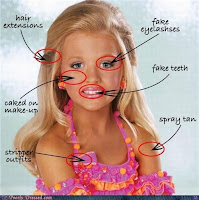Faking it: How much is too much?
When did faking it become so natural?
Open any magazine, and you'll find it featuring beautiful men and women who have been faked. Retouched to no end, the models are flawless shadows of their real selves. I stumbled across an interesting post by a fellow blogger. Lola Seicento is a blogger hailing from Los Angeles, and she wrote about Demi Moore's campaign for Helena Rubinstein. Specficially, Seicento touched on the scandal which followed once the images were released. Demi had been almost unrecognizably re-touched, and resembled her twenty-three year old daughter more than her own self.
Lola's Secret Beauty Blog - Demi Moore for Helena Rubinstein
The beauty industry isn't known for being transparent. From ingredients to benefits (or lack thereof), much is concealed from purchasers. Almost every image displayed in the media has been altered somehow. The question lately is how much is acceptable in terms of digital altering-and what impact does this have on society?
With eating disorders at an all time high, the quest for "perfection" is always just out of reach. When as a society, will be start holding people or corporations accountable? I appreciate beautiful artwork, people, fashion just as much as the next beauty junkie out there. My Vogues hold a special place in my heart-and on my coffee table. I don't expect complete transparency when I open a magazine, or see an ad with a beautiful model gracing the page. I do expect some level of accountability-and realism. Tools such as Photoshop are fantastic for cleaning up hairlines, brightening eyes, etc... What needs to stop is slimming down thighs of size two models, elongating necks, and contorting face shapes.
A fantastic video which has been circulating for some time was put together by Dove. This video shows just how much effort goes into creating the beautiful models we see in ad campaigns, and the tweaking of the images once they're shot.
Dove Evolution Video
Should I have higher expectations when it comes to what I see in magazines? Will beauty campaigns ever feature real untouched beauty? Only time will tell.
Xo
T


I agree that the beauty industry has taken it too far in trying to portray "perfect" images of people in ads. It has created a society that is constantly striving to achieve this "perfection", never really being happy with the way they are. However, I think consumers are definitely beginning to push a lot more for transparency in the fashion and beauty industry and are starting to expect to see more real images of models and celebrities. I always enjoy when un-retouched images of models are released, because it shows that they aren't actually perfect, and may have wrinkles or cellulite.
ReplyDeleteRegulatory bodies are also beginning to take note from consumer complaints and have begun to take legal action against misleading ads in the beauty and fashion industry. The Advertising Standards Authority in the UK has issued recent rulings against major cosmetics companies, like L'Oreal, Maybelline and Lancome for printing overly retouched ads for their products. One involved a Lancome ad featuring Julia Roberts, and another L'Oreal ad featuring Christy Turlington. You can check out the rulings here, http://www.asa.org.uk/Resource-Centre/Hot-Topics/Cosmetic.aspx
I think it's great that the beauty and fashion industry is beginning to be held more accountable for their advertising and hope that we will begin to see a much larger shift in the industry.
Thanks so much for citing my post! This is an issue that I think about a great deal. Love your post!!
ReplyDelete